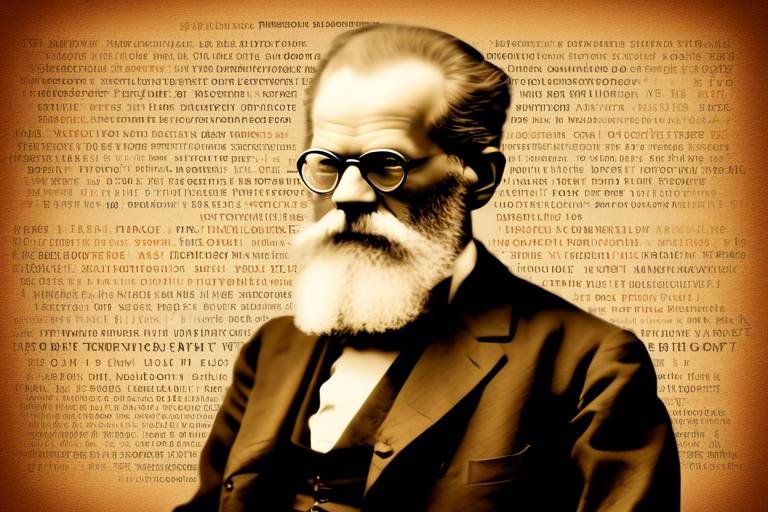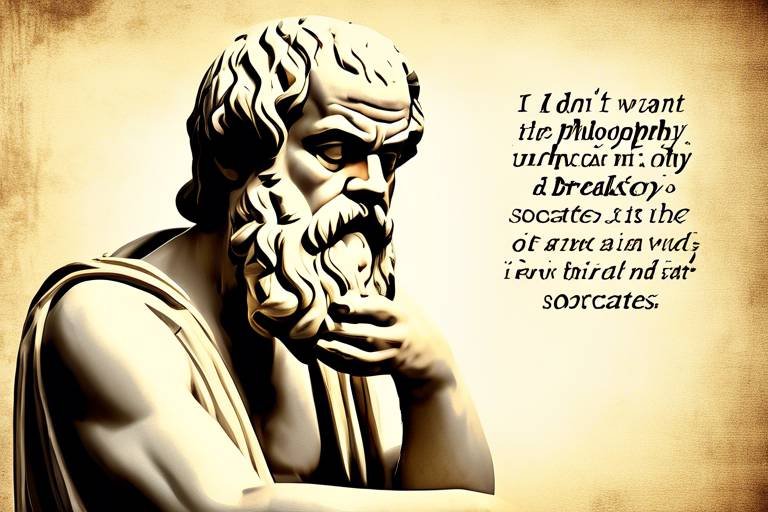A Glimpse into the Transcendentalist Philosophy of Ralph Waldo Emerson
Ralph Waldo Emerson, a beacon of the transcendentalist movement, invites us to explore a world where intuition reigns supreme over cold, hard rationalism. His philosophy, which blossomed in the early 19th century, serves as a powerful antidote to the materialistic tendencies of his time. But what exactly is transcendentalism? At its core, it is a profound belief in the power of the individual and the spiritual insights that can be gleaned from nature. Emerson’s ideas challenge us to look beyond societal norms and tap into our inner selves to find true understanding and meaning.
Imagine standing in a lush forest, the sunlight filtering through the leaves, a gentle breeze whispering secrets of the universe. This is the essence of Emerson’s philosophy—an invitation to connect with nature and, through it, with our own inner truths. He argues that every person has the ability to transcend the ordinary and reach for something greater. In a world that often pushes conformity and material success, Emerson’s call to action is as relevant today as it was in his time. He encourages us to be self-reliant and trust our instincts, reminding us that our unique perspectives are valuable and necessary for a richer understanding of life.
Emerson’s transcendentalism is not just a philosophical stance; it is a lifestyle. He believed that by embracing our individuality and rejecting societal pressures, we could cultivate a deeper connection with the world around us. This journey towards self-discovery often begins with a simple yet profound question: “Who am I?” Through this exploration, he invites us to unlock our potential and realize that we are all part of a larger tapestry of existence. The beauty of this philosophy lies in its ability to inspire personal growth and a profound appreciation for the interconnectedness of all life.
- What is transcendentalism? Transcendentalism is a philosophical movement that emphasizes the inherent goodness of people and nature, advocating for spiritual insight and personal intuition over materialism and rationalism.
- How did Emerson influence American literature? Emerson’s ideas significantly shaped American literature, inspiring writers like Henry David Thoreau and Walt Whitman to explore themes of nature, individuality, and spirituality in their works.
- What are the key principles of Emerson's philosophy? Key principles include self-reliance, the importance of nature, and the belief in the goodness of individuals, encouraging a personal journey towards truth.

Origins of Transcendentalism
This article explores the core tenets of Ralph Waldo Emerson's transcendentalist philosophy, its historical context, and its lasting impact on literature, culture, and individual thought.
Transcendentalism, a fascinating movement that emerged in the early 19th century, was like a breath of fresh air in a world suffocated by rationalism and materialism. Imagine a time when society was heavily focused on logic and tangible wealth, where people measured success by their possessions rather than their inner peace. In this environment, a group of thinkers, led by Emerson, began to advocate for a more profound understanding of life—one that emphasized spiritual insight and personal intuition as pathways to grasp the universe's mysteries.
At its core, transcendentalism was not just a philosophical stance; it was a call to action. It urged individuals to look beyond the surface of things and connect with their inner selves and the world around them. The movement was significantly influenced by various factors:
- Romanticism: This artistic and intellectual movement celebrated emotion, nature, and individualism, laying the groundwork for transcendentalist thought.
- Eastern Philosophies: The teachings of Hinduism and Buddhism introduced concepts of the self and the universe that resonated with transcendentalist ideals.
- Social Reform: The period was ripe with movements advocating for abolition, women's rights, and education reform, all of which aligned with the transcendentalist belief in the inherent goodness of people.
Emerson and his contemporaries believed that every individual possessed an innate ability to connect with the divine and the universe. This belief was revolutionary, as it challenged the prevailing notion that knowledge and understanding could only be derived from established institutions or traditional doctrines. Instead, they posited that true knowledge comes from within, igniting a spark of personal empowerment and encouraging a deeper exploration of one’s beliefs.
In essence, the origins of transcendentalism were rooted in a desire to transcend the limitations imposed by society and to seek a more authentic existence. This quest for truth and understanding would not only shape the philosophical landscape of the time but also leave a lasting legacy on American culture and literature.
Emerson's philosophy emphasizes self-reliance, the inherent goodness of people, and the importance of nature, encouraging individuals to trust their instincts and seek personal truth.
Emerson champions self-reliance as a fundamental virtue, arguing that individuals should depend on their intuition and judgment rather than conform to societal expectations or traditions.
Intuition, for Emerson, serves as a guiding force, leading individuals to deeper truths and authentic experiences, fostering a sense of personal empowerment and spiritual enlightenment.
Emerson's rejection of conformity encourages people to embrace their unique identities, challenging societal norms to cultivate a more profound understanding of themselves and their place in the world.
Nature holds a central place in Emerson's philosophy, viewed as a source of inspiration and spiritual connection, reflecting the divine and offering insights into the human experience.
Emerson's transcendentalist ideas significantly shaped American literature, inspiring writers like Henry David Thoreau and Walt Whitman to explore themes of nature, individuality, and spirituality in their works.
Henry David Thoreau, a protégé of Emerson, expanded on transcendentalist principles in his writings, particularly in Walden, where he explores simplicity and the beauty of nature.
Walt Whitman's poetry embodies Emerson's ideals, celebrating the individual spirit and the interconnectedness of all life, reflecting a transcendentalist view of humanity and nature.
- What is transcendentalism? Transcendentalism is a philosophical movement that emphasizes individual intuition and the inherent goodness of people, advocating for a deeper connection with nature and the universe.
- Who was Ralph Waldo Emerson? Ralph Waldo Emerson was a 19th-century American philosopher, essayist, and poet, known for his role in the transcendentalist movement and his advocacy for self-reliance and individualism.
- How did transcendentalism influence American literature? Transcendentalism inspired many American writers, encouraging them to explore themes of nature, individuality, and spirituality, significantly shaping the literary landscape of the time.

Key Principles of Emerson's Philosophy
Ralph Waldo Emerson's philosophy is a rich tapestry woven from the threads of self-reliance, individualism, and a profound connection to nature. At the heart of Emerson's thought lies the belief that every individual is inherently good and possesses a unique intuition that can guide them toward truth and understanding. This idea challenges the conventional wisdom of the time, which often prioritized societal norms and material success over personal insight and spiritual growth.
One of the most striking aspects of Emerson's philosophy is his emphasis on self-reliance. He argues that individuals should cultivate their own beliefs and values, rather than blindly adhering to the expectations of society. This notion resonates deeply today, as many people grapple with the pressures to conform in various aspects of life, from career choices to personal beliefs. Emerson's call to embrace one's authentic self is not just a philosophy; it is a rallying cry for personal empowerment. He famously stated, "Trust thyself: every heart vibrates to that iron string," urging us to listen to our inner voice and trust our instincts.
In addition to self-reliance, Emerson's philosophy highlights the importance of intuition. He believed that our intuitive insights are often more reliable than the rational thoughts that cloud our judgment. For Emerson, intuition acts as a guiding force, illuminating the path toward deeper truths and authentic experiences. This perspective encourages individuals to look inward for answers, rather than relying solely on external validation or societal approval. Imagine standing at a crossroads, where one path is well-trodden and familiar, but the other is overgrown and uncharted; Emerson would advocate for taking the less traveled road, trusting that your intuition will lead you to a richer understanding of yourself and the world.
Moreover, Emerson's rejection of conformity is a cornerstone of his philosophy. He challenges us to break free from the shackles of societal norms and expectations, urging individuals to embrace their unique identities. This idea is especially relevant in today's world, where social media and cultural pressures often compel us to fit into predefined molds. Emerson's encouragement to defy conformity serves as a reminder that true understanding and fulfillment come from within. By challenging the status quo, we can cultivate a more profound understanding of ourselves and our place in the universe.
Central to Emerson's philosophy is the relationship between humanity and nature. He viewed nature not just as a backdrop for human activity, but as a vital source of inspiration and spiritual connection. Emerson believed that by immersing ourselves in the natural world, we can gain insights into the divine and our own existence. Nature, in his eyes, reflects the beauty and complexity of life, offering lessons that can guide us toward personal growth. As he eloquently put it, "Nature always wears the colors of the spirit," suggesting that our perceptions of nature are deeply intertwined with our inner selves.
In conclusion, the key principles of Emerson's philosophy advocate for a life lived authentically, guided by intuition and a deep appreciation for nature. By embracing self-reliance and rejecting conformity, individuals can embark on a journey of self-discovery and empowerment. Emerson's ideas continue to resonate, encouraging us to trust ourselves and seek our own truths in a world that often tries to dictate who we should be.
- What is the main idea of Emerson's philosophy? Emerson's philosophy emphasizes self-reliance, individual intuition, and a deep connection to nature as pathways to understanding oneself and the universe.
- How does Emerson define self-reliance? Self-reliance, according to Emerson, is the ability to trust one's own instincts and judgment rather than conforming to societal expectations.
- Why is nature important in Emerson's thought? Emerson views nature as a source of inspiration and spiritual connection, reflecting deeper truths about humanity and the divine.
- How did Emerson influence American literature? Emerson's transcendentalist ideas inspired writers like Thoreau and Whitman, who explored themes of individuality and nature in their works.

Self-Reliance and Individualism
When we dive into the heart of Ralph Waldo Emerson's philosophy, we find that **self-reliance** is not just a concept; it’s a way of life. Emerson passionately champions the idea that individuals should cultivate their own thoughts and beliefs, rather than allowing societal norms to dictate their existence. Imagine standing on a cliff, overlooking a vast ocean of possibilities. That’s what self-reliance feels like—an exhilarating leap into the unknown, where you trust your instincts to guide you. Emerson argues that true greatness comes from within, urging us to embrace our unique perspectives and experiences.
At its core, self-reliance is about **individualism**—the belief that each person is inherently valuable and capable of making their own choices. Emerson challenges us to break free from the chains of conformity. He poses a provocative question: Why should we conform to the expectations of others when we have the power to carve our own path? This idea resonates deeply, especially in a world that often encourages us to fit into predefined molds. By trusting ourselves, we can discover our true identities and live authentically.
Emerson's emphasis on **intuition** plays a crucial role in this journey. He believes that our inner voice, that gut feeling we sometimes ignore, is a powerful guide. It's like having a compass that points us toward our personal truths. When we learn to listen to this inner guidance, we unlock a wellspring of creativity and insight. It’s not just about making decisions; it’s about understanding who we are at our core. Emerson encourages us to embrace our instincts, as they lead us to experiences that resonate with our true selves.
Moreover, rejecting conformity isn't merely an act of rebellion; it's an invitation to explore our individuality. Emerson suggests that by stepping away from societal pressures, we can discover our passions and purpose. The journey of self-discovery is often fraught with challenges, but it’s also incredibly rewarding. Think of it as a treasure hunt where the greatest treasure is the realization of your own worth and potential. By daring to be different, we not only enrich our lives but inspire others to do the same.
In summary, Emerson's philosophy of self-reliance and individualism serves as a powerful reminder that we are the architects of our own lives. By trusting our intuition and embracing our unique identities, we can navigate the complexities of existence with confidence and authenticity. So, the next time you find yourself questioning your path, remember Emerson’s words and take that leap into the unknown. After all, the journey of self-discovery is one of the most profound adventures we can embark on.
- What is self-reliance according to Emerson? Self-reliance, for Emerson, is the ability to trust oneself and one's intuition, making independent choices rather than conforming to societal expectations.
- How does Emerson view individuality? Emerson sees individuality as a vital aspect of personal growth, encouraging people to embrace their unique identities and perspectives.
- Why is intuition important in Emerson's philosophy? Intuition is considered a guiding force that leads individuals to deeper truths and authentic experiences, fostering empowerment and spiritual enlightenment.

The Importance of Intuition
This article explores the core tenets of Ralph Waldo Emerson's transcendentalist philosophy, its historical context, and its lasting impact on literature, culture, and individual thought.
Transcendentalism emerged in the early 19th century as a reaction against rationalism and materialism, advocating for spiritual insight and personal intuition as pathways to understanding the universe.
Emerson's philosophy emphasizes self-reliance, the inherent goodness of people, and the importance of nature, encouraging individuals to trust their instincts and seek personal truth.
Emerson champions self-reliance as a fundamental virtue, arguing that individuals should depend on their intuition and judgment rather than conform to societal expectations or traditions.
For Emerson, intuition is not just a fleeting feeling; it's a powerful guiding force that connects us to deeper truths about ourselves and the universe. Imagine standing at the edge of a vast forest, where every rustle of leaves and chirp of birds speaks to your soul. This is the essence of intuition—an innate understanding that transcends logic and reason. Emerson believed that by embracing our intuitive insights, we unlock a pathway to personal empowerment and spiritual enlightenment.
He argued that intuition serves as a compass, leading us through the complexities of life. Instead of relying solely on external validation or societal norms, Emerson encouraged individuals to listen to that inner voice. This approach fosters a sense of authenticity, allowing us to live in alignment with our true selves. Think of it as navigating through a dense fog; while the path may not always be clear, trusting your instincts can guide you safely to your destination.
Moreover, Emerson's emphasis on intuition invites us to challenge the status quo. In a world that often prioritizes conformity, he urged us to cultivate our unique perspectives and insights. This act of trusting oneself can be liberating. It allows for a richer, more fulfilling experience of life, where we are not mere spectators but active participants in our own narratives.
In summary, the importance of intuition in Emerson's philosophy cannot be overstated. It is the lifeblood of self-discovery and personal growth, urging us to break free from the chains of societal expectations and embrace our authentic selves. So, the next time you feel that little nudge in your gut or a spark of inspiration, remember Emerson's words and let your intuition lead the way.
Nature holds a central place in Emerson's philosophy, viewed as a source of inspiration and spiritual connection, reflecting the divine and offering insights into the human experience.
Emerson's transcendentalist ideas significantly shaped American literature, inspiring writers like Henry David Thoreau and Walt Whitman to explore themes of nature, individuality, and spirituality in their works.
Henry David Thoreau, a protégé of Emerson, expanded on transcendentalist principles in his writings, particularly in Walden, where he explores simplicity and the beauty of nature.
Walt Whitman's poetry embodies Emerson's ideals, celebrating the individual spirit and the interconnectedness of all life, reflecting a transcendentalist view of humanity and nature.
- What is transcendentalism? Transcendentalism is a philosophical movement that emphasizes the inherent goodness of people and nature, advocating for personal intuition and spiritual insight over societal norms.
- How did Emerson influence other writers? Emerson's ideas inspired writers like Thoreau and Whitman, who explored themes of nature, individuality, and spirituality in their works.
- Why is intuition important in Emerson's philosophy? Intuition serves as a guiding force, helping individuals connect with their true selves and navigate life's complexities without being constrained by societal expectations.

Rejecting Conformity
Ralph Waldo Emerson, a beacon of individuality, passionately championed the idea of rejecting conformity. He believed that society often imposes a set of rules and expectations that can stifle our true selves. You know that feeling when you’re at a party, and everyone seems to be following the same script? Emerson would argue that this is a prime example of conformity at play. Instead of blending in, he urged individuals to break free from the mold and embrace their unique identities. This isn't just about being different for the sake of it; it's about finding your authentic voice in a world that often tries to drown it out.
Emerson posited that conformity leads to a kind of spiritual stagnation. When we follow the crowd, we risk losing touch with our own thoughts and feelings. He famously stated, “Whoso would be a man must be a nonconformist.” This powerful declaration serves as a rallying cry for anyone feeling the weight of societal pressure. Emerson was convinced that true growth and understanding come from listening to our inner selves rather than the external noise. Think of it like a river: if it simply followed the banks laid out for it, it would never carve its own path or create the stunning landscapes we admire.
Furthermore, rejecting conformity allows for personal empowerment. When you trust your instincts and stand by your beliefs, you cultivate a sense of strength that can be incredibly liberating. Emerson believed that every individual possesses an innate goodness and wisdom, and by rejecting societal norms, we can tap into this reservoir of potential. This process can be likened to peeling back layers of an onion; each layer removed reveals more of the true self beneath. It’s a journey of self-discovery that often leads to profound insights and a deeper connection to the world.
However, this journey isn’t always easy. Society often pushes back against those who dare to be different. It can be intimidating to challenge the status quo, but Emerson encouraged us to view this challenge as an opportunity for growth. He believed that by embracing our individuality, we not only enrich our own lives but also inspire others to do the same. As we forge our paths, we create ripples in the fabric of society, encouraging others to question, explore, and ultimately reject conformity.
In summary, Emerson’s call to reject conformity is a call to action for all of us. It invites us to step outside our comfort zones, embrace our true selves, and challenge the societal norms that seek to define us. The rewards are immense: a richer, more fulfilling life that resonates with authenticity and joy. So, the next time you feel the urge to conform, remember Emerson’s words and consider the beauty of being uniquely you.
- What is transcendentalism? Transcendentalism is a philosophical movement that emphasizes the inherent goodness of people and nature, advocating for personal intuition and spiritual insight.
- Why is self-reliance important in Emerson's philosophy? Self-reliance is crucial as it encourages individuals to trust their instincts and judgments, fostering personal growth and authenticity.
- How did Emerson influence American literature? Emerson's ideas inspired many writers, including Thoreau and Whitman, to explore themes of individuality, nature, and spirituality in their works.

The Role of Nature
In the heart of Ralph Waldo Emerson's transcendentalist philosophy lies a profound reverence for nature. He viewed the natural world not merely as a backdrop for human existence but as a living entity that holds the key to spiritual insight and personal growth. Emerson believed that nature serves as a mirror reflecting the divine, allowing individuals to connect with something greater than themselves. This connection is not just a fleeting experience; it’s a fundamental aspect of understanding who we are and our place in the universe.
Emerson famously stated, “In the presence of nature, a wild delight runs through the man, in spite of real sorrows.” This encapsulates the idea that nature has the power to uplift the human spirit, providing solace and inspiration amid life's challenges. For Emerson, the beauty and complexity of the natural world could lead to profound revelations about existence. He encouraged people to immerse themselves in nature, to observe its rhythms, and to draw wisdom from its cycles. The act of wandering through forests, sitting by rivers, or gazing at the stars is not just a pastime; it’s a journey toward self-discovery and enlightenment.
Emerson's view of nature is deeply intertwined with his belief in the inherent goodness of people. He argued that just as nature is fundamentally good and harmonious, so too are human beings. This belief fosters a sense of optimism and encourages individuals to seek their truth in the natural world. Emerson posited that by aligning oneself with nature, one could tap into an innate wisdom that transcends societal constructs and expectations. The natural world becomes a source of guidance, urging individuals to trust their instincts and embrace their unique paths.
Moreover, Emerson’s writings often depict nature as a teacher. He believed that every element of nature—from the smallest blade of grass to the vast expanse of the sky—has something to impart. This perspective invites individuals to engage in a dialogue with nature, listening and learning from its lessons. For instance, the changing seasons can symbolize the cycles of life, reminding us of the importance of growth, decay, and renewal. By observing these processes, we can gain insights into our own lives and the transformations we undergo.
To illustrate the significance of nature in Emerson's philosophy, consider the following key aspects:
- Spiritual Connection: Nature is a pathway to understanding the divine, allowing individuals to experience spirituality in tangible ways.
- Personal Empowerment: Engaging with nature fosters a sense of autonomy and self-discovery, encouraging individuals to trust their instincts.
- Reflection and Insight: Nature serves as a mirror, reflecting our inner selves and prompting introspection.
In conclusion, Emerson's transcendentalist philosophy elevates nature to a sacred status, inviting us to explore its depths and embrace its lessons. By fostering a relationship with the natural world, we not only enrich our understanding of ourselves but also cultivate a deeper appreciation for the interconnectedness of all life. Emerson's call to immerse ourselves in nature remains relevant today, reminding us that in the hustle and bustle of modern life, we can still find clarity and inspiration in the beauty that surrounds us.
Q: Why is nature important in Emerson's philosophy?
A: Nature is central to Emerson's philosophy as it serves as a source of inspiration, spiritual connection, and personal empowerment. He believed that engaging with nature allows individuals to access deeper truths and understand their place in the universe.
Q: How does Emerson view the relationship between humanity and nature?
A: Emerson sees humanity and nature as interconnected. He believes that by aligning ourselves with the natural world, we can tap into our inherent goodness and wisdom, fostering a sense of individuality and authenticity.
Q: What can we learn from Emerson's perspective on nature today?
A: Emerson's perspective encourages us to reconnect with nature, to observe its beauty, and to draw insights from it. In our fast-paced lives, engaging with nature can lead to personal growth and a deeper understanding of ourselves.

Influence on American Literature
Ralph Waldo Emerson's transcendentalist philosophy has left an indelible mark on American literature, acting as a catalyst for a literary movement that championed individualism, nature, and spirituality. His ideas resonated deeply with contemporaries and future writers alike, inspiring them to explore themes that reflect a profound connection to the self and the natural world. Emerson's influence is not just a footnote in the annals of literary history; it is a vibrant thread woven into the fabric of American thought and creativity.
One of the most notable writers influenced by Emerson was Henry David Thoreau. Thoreau, a close friend and protégé of Emerson, took the principles of transcendentalism and expanded upon them in his seminal work, Walden. In this book, Thoreau reflects on simple living in natural surroundings, advocating for a life of purpose and authenticity. He famously wrote, “I went to the woods because I wished to live deliberately, to front only the essential facts of life.” This sentiment echoes Emerson's call for self-reliance and individualism, as Thoreau sought not just to observe nature but to immerse himself in it, illustrating how transcendentalism encourages a deep, personal relationship with the world around us.
Another literary giant influenced by Emerson was Walt Whitman. In his groundbreaking poetry collection Leaves of Grass, Whitman celebrates the individual spirit and the interconnectedness of all life. He embodies the essence of Emerson's transcendentalism, as his work reflects a belief in the inherent goodness of humanity and the divine presence within nature. Whitman's famous line, “I am large, I contain multitudes,” captures the transcendentalist view that each person is a microcosm of the universe, emphasizing the importance of embracing one's unique identity while recognizing the shared human experience.
Emerson's ideas also paved the way for later literary movements, such as the Beat Generation and Modernism, where writers sought to break free from conventional forms and explore new ways of expression. Authors like Jack Kerouac and Allen Ginsberg drew inspiration from Emerson's emphasis on spontaneity and the quest for personal truth. They, too, sought to challenge societal norms and express their individuality, reflecting Emerson's belief that true understanding comes from within.
In addition to influencing individual authors, Emerson's transcendentalism contributed to a broader cultural shift in American literature, leading to a greater appreciation for nature as a source of inspiration and wisdom. This appreciation is evident in the works of poets and writers who followed, such as Emily Dickinson and Robert Frost, who both explored themes of nature, existence, and introspection in their poetry. Their works often resonate with Emerson’s belief that nature serves as a conduit for spiritual insight and understanding.
In summary, the influence of Ralph Waldo Emerson on American literature is profound and far-reaching. His transcendentalist philosophy not only shaped the works of his contemporaries but also inspired generations of writers to embrace their individuality, seek truth in nature, and challenge societal norms. Through the lens of Emerson's ideas, literature became a vehicle for personal expression and spiritual exploration, forever changing the landscape of American thought.
- What is transcendentalism? - Transcendentalism is a philosophical movement that emerged in the early 19th century, emphasizing the importance of intuition, individualism, and the inherent goodness of both people and nature.
- How did Emerson influence Thoreau? - Emerson mentored Thoreau, encouraging him to explore his ideas on nature and individualism, which Thoreau beautifully encapsulated in his work Walden.
- What themes are prevalent in Whitman's poetry? - Whitman's poetry often celebrates individuality, the interconnectedness of all life, and the beauty of nature, reflecting the core tenets of Emerson's philosophy.
- Can you name other authors influenced by Emerson? - Yes, authors such as Emily Dickinson, Robert Frost, and members of the Beat Generation, including Jack Kerouac and Allen Ginsberg, were significantly influenced by Emerson's ideas.

Thoreau's Connection to Emerson
Henry David Thoreau, often seen as a key figure in the transcendentalist movement, had a profound connection to Ralph Waldo Emerson, who was not only his mentor but also a significant influence on his philosophical outlook. The relationship between these two thinkers was characterized by a shared belief in the importance of nature, individualism, and the rejection of societal norms. Thoreau admired Emerson's ability to articulate thoughts that resonated deeply with the human experience, and this admiration blossomed into a friendship that would shape Thoreau's own writings and ideas.
One of the most notable expressions of Thoreau's connection to Emerson can be found in his seminal work, Walden. In this book, Thoreau reflects on his experiment of living simply in a cabin near Walden Pond, a venture that embodied the transcendentalist ideals of self-reliance and a deep appreciation for nature. Thoreau's writing is infused with Emersonian themes, emphasizing the significance of personal experience and the quest for truth through direct engagement with the natural world. For Thoreau, nature was not just a backdrop for human activity; it was a living entity that offered profound lessons and insights into the essence of life itself.
Thoreau’s philosophy often mirrored Emerson’s belief in the concept of individualism. He encouraged people to break free from the constraints of society and to trust their instincts. This is evident in his famous quote, “If a man does not keep pace with his companions, perhaps it is because he hears a different drummer.” This idea resonates with Emerson’s call for self-reliance and the courage to pursue one’s own path, regardless of societal expectations. Thoreau's writings serve as a powerful reminder that true fulfillment comes from within, a notion that Emerson fervently championed.
Moreover, Thoreau’s commitment to social justice and his outspoken opposition to slavery and the Mexican-American War further illustrate his alignment with Emerson’s transcendentalist values. Both thinkers believed in the inherent goodness of people and the importance of standing up for one’s beliefs. Thoreau’s essay “Civil Disobedience” is a testament to this, advocating for individual conscience over government mandates, a principle that Emerson himself supported. Through his actions and writings, Thoreau not only honored Emerson’s teachings but also expanded upon them, carving out his unique voice within the transcendentalist tradition.
In summary, the connection between Thoreau and Emerson is a rich tapestry woven from shared ideals and mutual respect. Thoreau’s works reflect Emerson’s influence while simultaneously pushing the boundaries of transcendentalist thought. Their legacies continue to inspire individuals to seek their own truths, embrace the beauty of nature, and challenge societal norms. The bond between these two thinkers exemplifies the profound impact that mentorship and friendship can have on intellectual development, reminding us that great ideas often flourish through collaboration and dialogue.
- What is transcendentalism? Transcendentalism is a philosophical movement that emerged in the early 19th century, emphasizing the importance of personal intuition, spiritual insight, and the inherent goodness of people.
- How did Emerson influence Thoreau? Emerson served as a mentor to Thoreau, inspiring him to explore themes of nature, individuality, and social justice in his writings.
- What is the significance of Walden? Walden is a reflection of Thoreau's experiment in simple living, showcasing his belief in self-reliance and the importance of connecting with nature.
- What are the main ideas of Thoreau's Civil Disobedience? Thoreau's essay argues for individual conscience and the moral obligation to resist unjust laws, emphasizing the importance of personal integrity over governmental authority.

Walden,
This article explores the core tenets of Ralph Waldo Emerson's transcendentalist philosophy, its historical context, and its lasting impact on literature, culture, and individual thought.
Transcendentalism emerged in the early 19th century as a reaction against rationalism and materialism, advocating for spiritual insight and personal intuition as pathways to understanding the universe. It was a movement that sought to elevate the human spirit above the constraints of society and conventional thought. Think of it as a rebellion against the mundane, a call to explore the deeper meanings of existence.
Emerson's philosophy emphasizes self-reliance, the inherent goodness of people, and the importance of nature, encouraging individuals to trust their instincts and seek personal truth. He believed that each person has a unique perspective that contributes to a greater understanding of the world. In this way, Emerson was a champion of individuality, urging people to break free from societal molds and embrace their authentic selves.
Emerson champions self-reliance as a fundamental virtue, arguing that individuals should depend on their intuition and judgment rather than conform to societal expectations or traditions. It’s like being a lone wolf in a world full of sheep; he encourages us to listen to our inner voice, which often speaks louder than the clamor of the crowd. This self-trust is not just a personal journey but a path to universal truth.
Intuition, for Emerson, serves as a guiding force, leading individuals to deeper truths and authentic experiences, fostering a sense of personal empowerment and spiritual enlightenment. He viewed intuition as a direct line to the divine, a way to connect with the universe that transcends rational thought. In his eyes, trusting one's gut feeling is akin to tapping into a wellspring of wisdom that resides within each of us.
Emerson's rejection of conformity encourages people to embrace their unique identities, challenging societal norms to cultivate a more profound understanding of themselves and their place in the world. He believed that true greatness comes from authenticity, not from fitting in. By challenging the status quo, individuals can discover their true potential and contribute to the tapestry of human experience in a meaningful way.
Nature holds a central place in Emerson's philosophy, viewed as a source of inspiration and spiritual connection, reflecting the divine and offering insights into the human experience. He saw nature not just as a backdrop for human activity but as an active participant in the journey of self-discovery. To Emerson, the natural world was a mirror reflecting our own inner truths, inviting us to explore its depths.
Emerson's transcendentalist ideas significantly shaped American literature, inspiring writers like Henry David Thoreau and Walt Whitman to explore themes of nature, individuality, and spirituality in their works. His influence can be seen in the way these authors embraced the idea of the self as a central theme, pushing boundaries and encouraging readers to think deeply about their own lives.
Henry David Thoreau, a protégé of Emerson, expanded on transcendentalist principles in his writings, particularly in Walden, where he explores simplicity and the beauty of nature. Thoreau's time spent living in a cabin near Walden Pond was not just an experiment in minimalism; it was a profound statement about the importance of living deliberately and connecting with the natural world. He believed that by stripping away the excesses of society, one could discover the essence of life itself.
Walt Whitman's poetry embodies Emerson's ideals, celebrating the individual spirit and the interconnectedness of all life, reflecting a transcendentalist view of humanity and nature. His verses are a vibrant tapestry of human experience, echoing Emerson's call for authenticity and self-expression. Through Whitman's words, we see a celebration of the self that resonates with Emerson's philosophy, creating a legacy that continues to inspire.
Walden is not just a book; it’s a manifesto of self-reliance and a deep dive into the human condition. Thoreau’s narrative chronicles his experiment in simple living, where he sought to immerse himself in nature and live deliberately. By retreating to a small cabin, he aimed to strip life down to its essentials, discovering profound truths about existence and the natural world.
In Walden, Thoreau reflects on various themes, including:
- Simplicity: The importance of living with less and finding joy in the simple things.
- Nature: The healing and enlightening power of the natural world.
- Self-Sufficiency: The value of independence and personal responsibility.
Thoreau's insights challenge readers to reconsider their values and priorities, urging them to seek out a more meaningful existence. His eloquent prose paints a vivid picture of life at Walden Pond, inviting us to ponder our own relationship with nature and society.
Transcendentalism is a philosophical movement that emerged in the early 19th century, emphasizing the inherent goodness of people and nature, advocating for self-reliance and personal intuition as pathways to understanding the universe.
Ralph Waldo Emerson was a 19th-century American essayist, lecturer, philosopher, and poet, known for his role in the transcendentalist movement and his advocacy for individuality and self-reliance.
Emerson's ideas significantly influenced American literature by inspiring writers like Thoreau and Whitman to explore themes of nature, individuality, and spirituality, shaping the literary landscape of the time.
The main themes of Walden include simplicity, self-sufficiency, and the importance of nature in personal growth and understanding.

where he explores simplicity and the beauty of nature.
This article explores the core tenets of Ralph Waldo Emerson's transcendentalist philosophy, its historical context, and its lasting impact on literature, culture, and individual thought.
Transcendentalism emerged in the early 19th century as a reaction against rationalism and materialism, advocating for spiritual insight and personal intuition as pathways to understanding the universe.
Emerson's philosophy emphasizes self-reliance, the inherent goodness of people, and the importance of nature, encouraging individuals to trust their instincts and seek personal truth.
Emerson champions self-reliance as a fundamental virtue, arguing that individuals should depend on their intuition and judgment rather than conform to societal expectations or traditions.
Intuition, for Emerson, serves as a guiding force, leading individuals to deeper truths and authentic experiences, fostering a sense of personal empowerment and spiritual enlightenment.
Emerson's rejection of conformity encourages people to embrace their unique identities, challenging societal norms to cultivate a more profound understanding of themselves and their place in the world.
Nature holds a central place in Emerson's philosophy, viewed as a source of inspiration and spiritual connection, reflecting the divine and offering insights into the human experience.
Emerson's transcendentalist ideas significantly shaped American literature, inspiring writers like Henry David Thoreau and Walt Whitman to explore themes of nature, individuality, and spirituality in their works.
Henry David Thoreau, a protégé of Emerson, expanded on transcendentalist principles in his writings, particularly in Walden, where he explores simplicity and the beauty of nature.
In Walden, Thoreau immerses himself in the tranquility of the natural world, showcasing how simplicity can lead to profound insights. He believed that by stripping away the complexities of modern life, one could discover a deeper connection to the universe. Thoreau's time spent in a small cabin by Walden Pond is not just a retreat; it's a radical experiment in living deliberately. He writes, “I went to the woods because I wished to live deliberately, to front only the essential facts of life.” This quest for simplicity isn't merely about reducing material possessions; it's about cultivating a mindset that appreciates the beauty of the ordinary.
Thoreau's observations of nature serve as a canvas for his reflections on life, illustrating how the changing seasons mirror the cycles of human existence. The beauty of nature, for Thoreau, is not just something to behold but a source of inspiration that can guide one's thoughts and actions. He eloquently describes the sound of the wind, the rustle of leaves, and the stillness of the water, inviting readers to pause and appreciate the world around them. Through his vivid descriptions, he evokes a sense of wonder and invites us to reconnect with the simplicity that often eludes us in our fast-paced lives.
Moreover, Thoreau emphasizes the importance of solitude and introspection, suggesting that moments spent in nature can lead to greater self-awareness and clarity of thought. He argues that when we step away from society's noise, we can hear our inner voice more clearly. This idea resonates with Emerson's belief in self-reliance, as both thinkers advocate for a journey inward to discover one's true self.
- What is Transcendentalism? Transcendentalism is a philosophical movement that emerged in the early 19th century, promoting individual intuition and spiritual insight as the primary means of understanding the world.
- How did Emerson influence American literature? Emerson's ideas on individuality and nature inspired many American writers, including Thoreau and Whitman, to explore similar themes in their works.
- What is the significance of nature in Emerson's philosophy? Nature is viewed as a source of inspiration and spiritual connection, reflecting deeper truths about humanity and the universe.
- How does Thoreau's experience at Walden Pond relate to Emerson's teachings? Thoreau's time at Walden Pond embodies Emerson's principles of simplicity, self-reliance, and the importance of nature, as he sought to live deliberately and connect with the essence of life.

Whitman's Embrace of Individuality
Walt Whitman, a towering figure in American literature, serves as a vibrant example of Ralph Waldo Emerson's transcendentalist ideals, particularly through his profound celebration of individuality. In his groundbreaking work, Leaves of Grass, Whitman boldly asserts that every person is unique and possesses an intrinsic worth that deserves recognition and respect. This is not just a poetic flourish; it's a rallying cry for self-acceptance and authenticity in a world that often pressures individuals to conform.
Whitman's poetry reflects a deep understanding of the interconnectedness of all life, a theme that resonates with Emerson's philosophy. He famously declares, "I am large; I contain multitudes," suggesting that within each person lies a vast array of experiences, emotions, and identities. This line encapsulates Whitman's belief that embracing one's complexity is essential to fully experiencing life. By celebrating the individual spirit, he invites readers to explore their own depths and find strength in their personal narratives.
Moreover, Whitman's work emphasizes the beauty of diversity. He often writes about the various walks of life, from the laborer to the intellectual, showcasing the richness of human experience. In doing so, he challenges societal norms that seek to categorize and limit individuals based on race, class, or gender. For Whitman, every voice matters, and every story is worth telling. This celebration of diversity is not merely an artistic choice; it is a fundamental aspect of his transcendentalist beliefs.
In addition, Whitman's embrace of individuality can be seen in his innovative style and structure. He breaks away from traditional poetic forms, using free verse to convey a sense of freedom and spontaneity that mirrors his message. This stylistic choice reflects his belief that poetry, like life, should not be confined to rigid boundaries. Instead, it should flow organically, allowing for personal expression and exploration of the self.
Ultimately, Whitman's work serves as a powerful reminder of the importance of individuality in a world that often seeks to homogenize. His poetry encourages readers to embrace their true selves, to reject conformity, and to find beauty in their uniqueness. By doing so, he not only honors Emerson's legacy but also paves the way for future generations to celebrate their individuality and the rich tapestry of human experience.
- What is transcendentalism?
Transcendentalism is a philosophical movement that emerged in the early 19th century, emphasizing the importance of individual intuition and the spiritual connection to nature. - How did Emerson influence Whitman?
Emerson's ideas about individuality and the interconnectedness of all life deeply influenced Whitman's writing style and thematic choices. - What are some key themes in Whitman's poetry?
Whitman's poetry often explores themes of individuality, nature, democracy, and the collective human experience. - Why is "Leaves of Grass" significant?
"Leaves of Grass" is significant for its revolutionary approach to poetry, its themes of individuality, and its celebration of the human spirit.
Frequently Asked Questions
- What is Transcendentalism?
Transcendentalism is a philosophical movement that emerged in the early 19th century, primarily in the United States. It advocates for the belief that individuals can transcend the physical world and societal limitations through personal intuition and spiritual insight. This movement emphasizes the inherent goodness of people and the importance of nature as a source of inspiration.
- Who was Ralph Waldo Emerson?
Ralph Waldo Emerson was a prominent American essayist, lecturer, and philosopher who played a crucial role in the Transcendentalist movement. His works encourage self-reliance, individuality, and a deep connection with nature. Emerson's writings have had a lasting impact on American literature and culture, inspiring countless writers and thinkers.
- What are the key principles of Emerson's philosophy?
Emerson's philosophy revolves around several key principles, including self-reliance, the inherent goodness of individuals, and the importance of nature. He believed that individuals should trust their instincts and seek personal truth, rejecting societal norms in favor of authenticity and individualism.
- How does Emerson view nature?
For Emerson, nature is not just a backdrop for human activity; it is a vital source of inspiration and spiritual connection. He believed that nature reflects the divine and offers profound insights into the human experience, encouraging individuals to engage with the natural world to discover deeper truths.
- How did Emerson influence American literature?
Emerson's transcendentalist ideas significantly influenced American literature, inspiring writers like Henry David Thoreau and Walt Whitman. His emphasis on individuality, nature, and spirituality can be seen in their works, which explore similar themes and celebrate the unique human experience.
- What is the connection between Emerson and Henry David Thoreau?
Henry David Thoreau was a protégé of Emerson and a key figure in the transcendentalist movement. Thoreau expanded on Emerson's principles in his writing, particularly in his famous work, Walden, where he explores themes of simplicity, nature, and self-discovery.
- How does Walt Whitman's work reflect Emerson's ideals?
Walt Whitman's poetry embodies Emerson's transcendentalist ideals by celebrating individuality and the interconnectedness of all life. His work reflects a deep appreciation for nature and the human spirit, mirroring Emerson's belief in the importance of personal truth and self-expression.



















